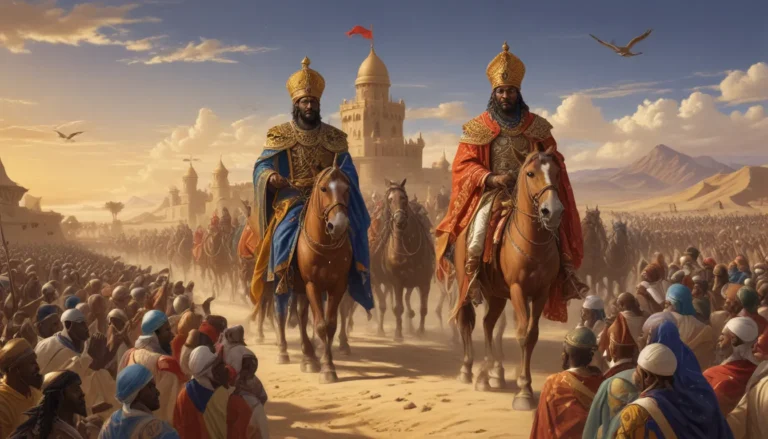The images in our articles may not match the content exactly. They are used to grab your attention, not to show the exact details in the text. The images complement the text but do not replace it.
George Washington Carver’s legacy as a pioneering scientist and advocate for sustainable farming continues to captivate audiences worldwide. Born into slavery in the 19th century, Carver overcame tremendous obstacles to become one of the most influential figures of his time. His groundbreaking research in botany, along with his unwavering commitment to education, shaped the agricultural industry and transformed the lives of countless farmers. In this article, we delve into 15 astonishing facts about George Washington Carver that highlight his remarkable achievements and enduring legacy. From his innovative farming techniques to his advocacy for racial equality, Carver’s story is a testament to perseverance, intelligence, and inspiration.
Unveiling the Life of George Washington Carver
-
George Washington Carver was born into slavery: Born around 1864 in Diamond, Missouri, Carver’s exact birthdate and parentage remain unknown due to the lack of accurate records during that era. Despite the challenges of his upbringing, Carver’s extraordinary journey would soon unfold.
-
Carver made history at Iowa State College: In 1891, George Washington Carver shattered barriers by becoming the first African American to be admitted to Iowa State College, now known as Iowa State University. His studies in botany and agriculture laid the groundwork for his groundbreaking research in these fields.
-
Carver’s agricultural contributions: Carver’s research focused on improving soil quality and exploring alternative crops such as peanuts, sweet potatoes, and soybeans. His innovative uses for these crops revolutionized agriculture, benefiting farmers and enhancing food production.
-
The legacy of the “Peanut Man”: George Washington Carver’s extensive research on peanuts led to the discovery of over 300 uses for this versatile legume. From peanut butter to cooking oil and cosmetics, his inventions reshaped the agricultural and food industries.
-
Diversifying crops for economic stability: By advocating for the cultivation of alternative crops like peanuts and sweet potatoes, Carver helped farmers reduce their reliance on cotton. This strategic shift mitigated the detrimental effects of the boll weevil infestation and bolstered farmers’ economic well-being.
The Multifaceted Legacy of George Washington Carver
-
Championing sustainable farming practices: Carver emphasized the importance of crop rotation and soil conservation to preserve soil fertility. His teachings on sustainable farming practices fostered environmental awareness within the agricultural community, promoting long-term sustainability.
-
Educator and advocate at Tuskegee Institute: George Washington Carver dedicated over 47 years to teaching at the Tuskegee Institute, now Tuskegee University, in Alabama. His passion for education and mentorship inspired generations of African American students.
-
Innovations beyond agriculture: Carver’s ingenuity extended to developing a process for extracting blue, purple, and red dyes from plants. His groundbreaking techniques expanded the possibilities for natural dye production and offered sustainable alternatives to synthetic dyes.
-
Honors and accolades: Throughout his lifetime, Carver received numerous prestigious awards, including the Spingarn Medal in 1923 and an honorary Doctor of Science degree from Simpson College in 1928. His contributions to agriculture and beyond were widely recognized and celebrated.
-
Artistic endeavors: In addition to his scientific pursuits, George Washington Carver was a talented painter, capturing the beauty of nature through his artwork. His creative spirit reflected his deep appreciation for the diversity and wonder of the natural world.
Embracing George Washington Carver’s Enduring Legacy
-
Collaboration with Henry Ford: Carver collaborated with industrialist Henry Ford on research projects related to agriculture and manufacturing. Their shared commitment to innovation and social impact paved the way for transformative solutions to societal challenges.
-
Childhood curiosity and botanical passion: Carver’s fascination with plants from a young age laid the foundation for his lifelong dedication to botany and agricultural research. His boundless curiosity and love for nature propelled him towards groundbreaking discoveries.
-
Advocacy for racial equality: Throughout his life, George Washington Carver spoke out against racial inequality and discrimination. He believed fervently in the power of education to bridge racial divides and inspire positive change within society.
-
National recognition at Carver’s birthplace: The George Washington Carver National Monument in Diamond, Missouri, now stands as a tribute to the remarkable scientist and his pioneering contributions to agriculture. The monument honors his enduring legacy and serves as an educational beacon for future generations.
The Everlasting Impact of George Washington Carver
In conclusion, George Washington Carver’s profound impact on science, agriculture, and education resonates with individuals worldwide. His revolutionary work with peanuts and sustainable farming practices revolutionized agricultural norms and uplifted the lives of farmers. Carver’s unwavering dedication to education and his commitment to empowering others through knowledge continue to inspire generations. His legacy embodies perseverance, innovation, and social progress, leaving an indelible mark on history.
Frequently Asked Questions
-
Who was George Washington Carver?
George Washington Carver was a pioneering American scientist, educator, and inventor renowned for his groundbreaking research on peanuts and agricultural practices. -
What were Carver’s contributions to agriculture?
Carver’s research on peanuts and crop rotation techniques significantly improved farming practices, leading to the development of various peanut-based products that transformed the agricultural landscape. -
How did Carver impact education?
Carver’s passionate advocacy for education, especially in agriculture and science, was reflected in his role as an educator at the Tuskegee Institute and his outreach efforts to promote sustainable farming practices. -
What challenges did Carver face during his career?
As an African American scientist in an era marked by racial discrimination, Carver faced significant obstacles. Despite these challenges, he persevered and made substantial advancements in agricultural science. -
What is Carver’s enduring legacy?
Carver’s legacy continues to inspire scientists, innovators, and educators worldwide. His research and inventions have had a lasting impact on agriculture, shaping sustainable farming practices for generations to come.
Embrace the Legacy of George Washington Carver
The extraordinary achievements of George Washington Carver serve as a beacon of inspiration for individuals seeking to make a positive impact on the world. His profound commitment to scientific discovery, agricultural innovation, and education echoes through the corridors of history, shaping the landscape of sustainable farming practices and societal progress. As we reflect on Carver’s remarkable journey and enduring legacy, let his story ignite a spark of curiosity, innovation, and social change within each of us. Explore the legacy of George Washington Carver and join in celebrating the indomitable spirit of a true trailblazer in American history.






